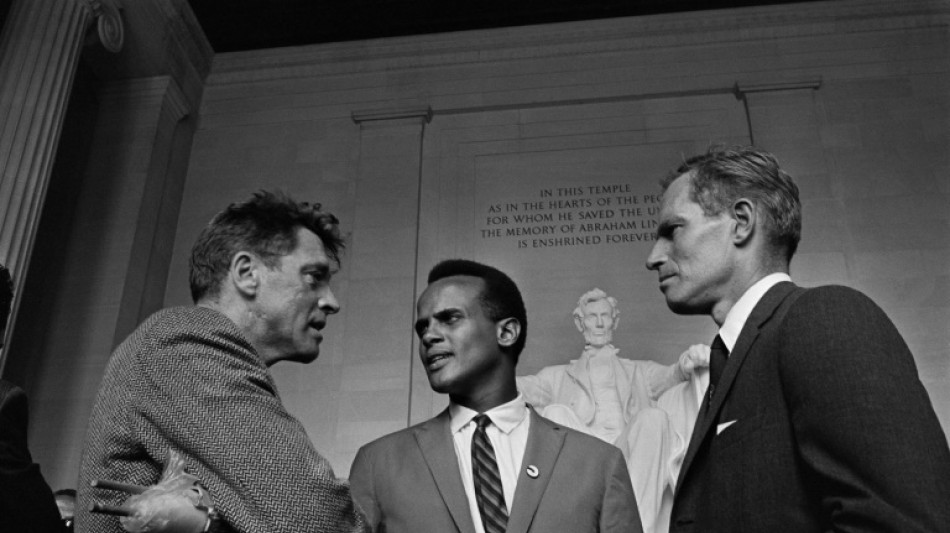
-
 Bellamy defies 'lunatic' reputation to inspire Wales revival
Bellamy defies 'lunatic' reputation to inspire Wales revival
-
Kremlin says US 'doing everything' to prolong 'war' in Ukraine

-
 Magritte painting nets auction record of $121 million
Magritte painting nets auction record of $121 million
-
Markets fluctuate as traders weigh geopolitical tensions

-
 N. Korea's latest weapon? Bombarding South with noise
N. Korea's latest weapon? Bombarding South with noise
-
'Kidnapped' Uganda opposition figure Besigye to appear at military court: lawyer

-
 Asian markets fluctuate as traders weigh geopolitical tensions
Asian markets fluctuate as traders weigh geopolitical tensions
-
'An inauspicious day': the landmines ruining Myanmar lives

-
 UN to vote again on Gaza ceasefire, US plans unclear
UN to vote again on Gaza ceasefire, US plans unclear
-
Japan's manga powerhouse 'Dragon Ball' turns 40

-
 Japanese, Koreans bottom of global love life survey
Japanese, Koreans bottom of global love life survey
-
Son blames 'mistakes' after South Korea held by Palestine in qualifier

-
 Japan ramps up tech ambitions with $65 bn for AI, chips
Japan ramps up tech ambitions with $65 bn for AI, chips
-
Lights, action, melodrama! Silent films get new reel at London haven

-
 Myanmar led world in landmine victims in 2023: monitor
Myanmar led world in landmine victims in 2023: monitor
-
ICC to sentence Timbuktu war criminal

-
 Ugandan opposition figure Besigye 'kidnapped', says wife
Ugandan opposition figure Besigye 'kidnapped', says wife
-
Australia's Jason Day eyes more major glory after resurgence

-
 Machu Picchu security boosted after visitors spread human ashes
Machu Picchu security boosted after visitors spread human ashes
-
Popovic hails Australia character in 'crazy' World Cup qualifier

-
 Taliban govt clearing 'un-Islamic' books from Afghanistan shelves
Taliban govt clearing 'un-Islamic' books from Afghanistan shelves
-
Argentina beat Peru as Uruguay hold Brazil

-
 Asian markets struggle as traders weigh geopolitical tensions
Asian markets struggle as traders weigh geopolitical tensions
-
Tatum stars as Celtics end Cavaliers unbeaten start

-
 Hurting India under pressure in blockbuster five-Test Australia series
Hurting India under pressure in blockbuster five-Test Australia series
-
'They killed her dream': Israel strike leaves woman footballer in coma

-
 Iraq holds its first census in nearly 40 years
Iraq holds its first census in nearly 40 years
-
Iraqis face tough homecoming a decade after IS rampage

-
 Russian net tightens around last civilians left in eastern Ukraine
Russian net tightens around last civilians left in eastern Ukraine
-
Olympic champion Tebogo aims to inspire next generation of African athletes

-
 Valencia on target as ten-man Ecuador upset Colombia
Valencia on target as ten-man Ecuador upset Colombia
-
'Rust' to premiere three years after on-set shooting

-
 Strike at French cognac maker Hennessy over measures in China spat
Strike at French cognac maker Hennessy over measures in China spat
-
Xi, Lula meet in Brasilia to 'enhance ties'

-
 SpaceX fails to repeat Starship booster catch, as Trump watches on
SpaceX fails to repeat Starship booster catch, as Trump watches on
-
'I have left a legacy': Nadal retires from tennis

-
 US recognizes Venezuela opposition's Gonzalez Urrutia as 'president-elect'
US recognizes Venezuela opposition's Gonzalez Urrutia as 'president-elect'
-
European powers, US seek to censure Iran at UN nuclear watchdog board

-
 UNAIDS chief says husband, Ugandan opposition figure Besigye, 'kidnapped'
UNAIDS chief says husband, Ugandan opposition figure Besigye, 'kidnapped'
-
Nadal's sensational career ends as Netherlands defeat Spain in Davis Cup

-
 US announces talks with Israel over civilian casualties in Gaza
US announces talks with Israel over civilian casualties in Gaza
-
SpaceX fails to repeat Starship booster catch, as Trump looks on

-
 G20 summit ends with Ukraine blame game
G20 summit ends with Ukraine blame game
-
Trump appoints TV celebrity 'Dr. Oz' to key US health post

-
 European stocks fall on Ukraine-Russia fears, US focused on earnings
European stocks fall on Ukraine-Russia fears, US focused on earnings
-
Last-gasp Szoboszlai penalty rescues Hungary draw with Germany

-
 Germany, Netherlands draw as Nations League group stage ends
Germany, Netherlands draw as Nations League group stage ends
-
Hong Kong tycoon Jimmy Lai takes witness stand in collusion trial

-
 Guardiola set to extend stay as Man City boss - reports
Guardiola set to extend stay as Man City boss - reports
-
Minnows Botswana hold Egypt to qualify with Mozambique, Tanzania


Harry Belafonte: legendary singer who lived out activism
Even at the height of his fame as a groundbreaking musician, Harry Belafonte was only interested in the money or the celebrity insofar as it could fuel his campaigns for social justice.
As the US civil rights movement gained momentum, Belafonte took on a role that went far beyond moral support. He became a confidant of Martin Luther King Jr. and personally opened his wallet to fund the cause.
"I could have made $2 billion or $3 billion -- and ended up with some very cruel addiction -- but I chose to be a civil rights warrior instead," the trailblazing singer and actor said in a 2007 interview.
Belafonte, who died of congestive heart failure on Tuesday at the age of 96, soared to the highest heights of showbiz -- the African American artist won an array of awards for his performances, introducing Caribbean flair to mainstream US music.
But he is also remembered for his deep personal investment in civil rights -- from the American struggle for racial equality to famine in Ethiopia to South Africa's battle against apartheid.
"When people think of activism, they always think some sacrifice is involved, but I've always considered it a privilege and an opportunity," he said in a 2004 speech at Emory University.
- Life of struggle -
Born in Harlem on March 1, 1927 to a Jamaican mother and a father from the French territory of Martinique, Belafonte spent part of his childhood in Jamaica before returning to New York, a binational upbringing that shaped his musical and political outlooks.
Despite his vocal gifts and striking good looks, Belafonte did not grow up believing he would enjoy a promising career.
He suffered dyslexia and dropped out of high school to serve as a US Navy munitions loader in World War II. When he returned, he had few employable skills and worked as a janitor.
But he showed gusto at the job and, as a tip, was given two tickets to a performance at the American Negro Theater, where he was mesmerized by the magnetic pull of the stage.
He took acting classes and, at the theater in Harlem, made a lifelong friend who became another groundbreaking African American actor: Sidney Poitier, who was born just eight days before Belafonte to parents from The Bahamas.
Belafonte said that his own Jamaican roots shaped "almost everything" in his life.
His mother came from Jamaica "to find the generosity of the American dream and discovered that that was not available to her," he told public television.
- Early fame... and controversy -
Belafonte's calypso, the genre of Caribbean music that drew from West African and French influences, offered a dash of exoticism for a United States in the midst of post-World War II prosperity and suburbanization.
His third album, entitled simply "Calypso" and released in 1956, became the first LP to sell more than one million copies in the United States.
The album featured what became Belafonte's signature song, "Day-O (The Banana Boat Song)." Based on a Jamaican folk tune, Belafonte sings with a Caribbean accent, "Stack banana 'til de morning come / Daylight come and we wan go home."
Belafonte scoffed at suggestions that the song was simply feel-good dance music, calling the track a rebellious take on workers who were demanding fair wages.
Even in his early career, Belafonte did not shy away from controversy.
He starred in the 1957 film "Island in the Sun" as an upwardly mobile Black politician on a fictional island who becomes involved with a woman from the white elite, in one of Hollywood's earliest depictions of inter-racial romance.
- Key role in US civil rights movement -
Belafonte broke racial barriers in entertainment and worked for racial justice in politics.
In 1954, he became the first African American man to win a Tony Award, for his role in the Broadway musical "John Murray Anderson's Almanac."
Six years later, he became the first African American to win an Emmy Award for "Tonight with Belafonte," his musical television program. He also won three Grammys.
Always wary of politicians, Belafonte met for three hours in 1960 with then-presidential candidate John F. Kennedy, who hoped to gain support from a prominent African American.
Kennedy did not initially win his endorsement, with Belafonte recalling later that the senator from Massachusetts "knew so little about the Black community."
But Belafonte helped arrange a meeting between King and Kennedy, who with his brother Robert F. Kennedy intervened months later when the civil rights leader was arrested in Georgia.
After his election, Kennedy appointed Belafonte to the advisory committee of the newly created Peace Corps, through which the young president hoped the United States would showcase its power through non-military means.
But Belafonte said that while many in the Peace Corps hoped to "show how beautiful we are as a people," his mission was different -- to expose young Americans to the struggles of the developing world.
Belafonte brought King and the Birmingham, Alabama pastor Fred Shuttlesworth to his New York apartment to plan out the 1963 campaign to integrate the notoriously racist southern city.
When King was thrown into a Birmingham jail, Belafonte raised $50,000 -- nearly $500,000 in current value -- to post his bail, at a time when the rise of pop music was bringing wealth and lavish lifestyles to many entertainers.
Later, Belafonte spent increasing time in Africa, especially Kenya, and became one of the foremost US artists fighting apartheid in South Africa.
His final album, "Paradise in Gazankulu," released in 1988, revolved around the oppression of black South Africans and was recorded partially in Johannesburg with local artists.
Belafonte also initiated the USA for Africa supergroup whose "We Are The World" song in 1985 raised millions of dollars for Ethiopia's famine victims.
- Fallout with King children -
Belafonte remained strident in his views late in his life.
In 2008, he called then-president George W. Bush "the greatest terrorist in the world" in reference to the Iraq invasion as the singer visited Venezuela to rally behind its firebrand president Hugo Chavez, a frequent US nemesis.
But Belafonte increasingly saw a gap with a younger generation.
In 2012, he took to task Jay-Z and his wife Beyonce, saying that the titanic music couple had "turned their back on social responsibility."
Jay-Z hit back in song, rapping "Mr. Day-O, major fail."
More painfully, Belafonte fell out with King's three surviving children, who kept him away from the funeral of the civil rights leader's widow Coretta Scott King, in part due to the singer's embrace of Chavez.
In 2014, Belafonte settled a lawsuit with the children, whom he accused of veering from their father's legacy, in a dispute over the singer's possession of documents from King.
Despite his frequent criticism of US policies, Belafonte said that the United States "offers a dream that cannot be fulfilled as easily anywhere else in the world" -- but one that is only attainable through "struggle."
P.Hernandez--AT

